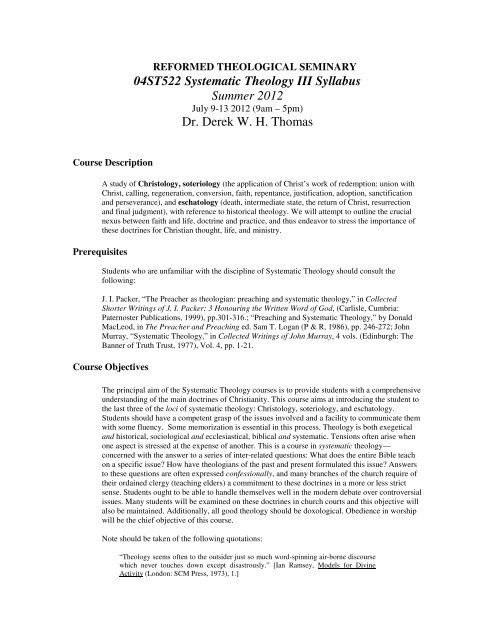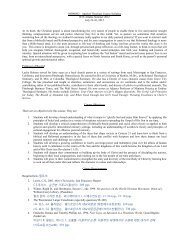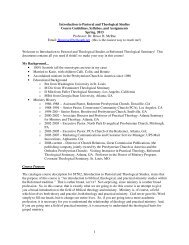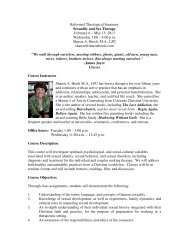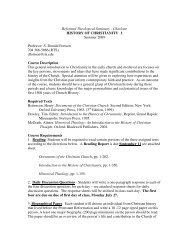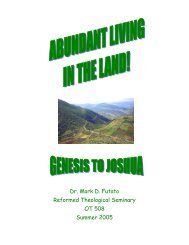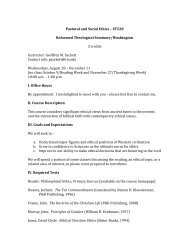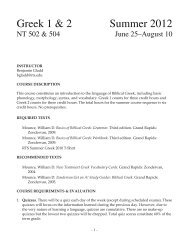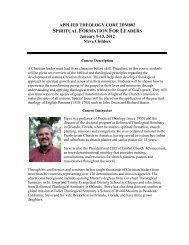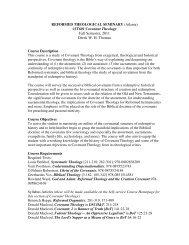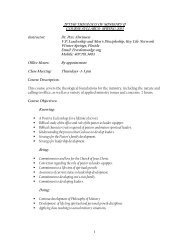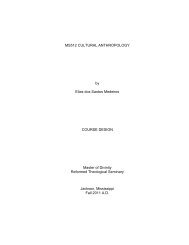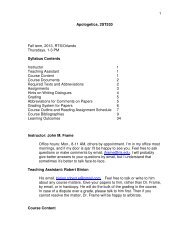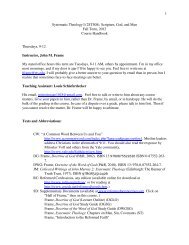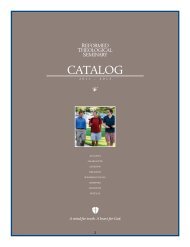04ST522 ST III - Reformed Theological Seminary
04ST522 ST III - Reformed Theological Seminary
04ST522 ST III - Reformed Theological Seminary
Create successful ePaper yourself
Turn your PDF publications into a flip-book with our unique Google optimized e-Paper software.
REFORMED THEOLOGICAL SEMINARY<br />
<strong>04<strong>ST</strong>522</strong> Systematic Theology <strong>III</strong> Syllabus<br />
Summer 2012<br />
July 9-13 2012 (9am – 5pm)<br />
Dr. Derek W. H. Thomas<br />
Course Description<br />
Prerequisites<br />
A study of Christology, soteriology (the application of Christ’s work of redemption: union with<br />
Christ, calling, regeneration, conversion, faith, repentance, justification, adoption, sanctification<br />
and perseverance), and eschatology (death, intermediate state, the return of Christ, resurrection<br />
and final judgment), with reference to historical theology. We will attempt to outline the crucial<br />
nexus between faith and life, doctrine and practice, and thus endeavor to stress the importance of<br />
these doctrines for Christian thought, life, and ministry.<br />
Students who are unfamiliar with the discipline of Systematic Theology should consult the<br />
following:<br />
J. I. Packer, “The Preacher as theologian: preaching and systematic theology,” in Collected<br />
Shorter Writings of J. I. Packer: 3 Honouring the Written Word of God, (Carlisle, Cumbria:<br />
Paternoster Publications, 1999), pp.301-316.; “Preaching and Systematic Theology,” by Donald<br />
MacLeod, in The Preacher and Preaching ed. Sam T. Logan (P & R, 1986), pp. 246-272; John<br />
Murray, “Systematic Theology,” in Collected Writings of John Murray, 4 vols. (Edinburgh: The<br />
Banner of Truth Trust, 1977), Vol. 4, pp. 1-21.<br />
Course Objectives<br />
The principal aim of the Systematic Theology courses is to provide students with a comprehensive<br />
understanding of the main doctrines of Christianity. This course aims at introducing the student to<br />
the last three of the loci of systematic theology: Christology, soteriology, and eschatology.<br />
Students should have a competent grasp of the issues involved and a facility to communicate them<br />
with some fluency. Some memorization is essential in this process. Theology is both exegetical<br />
and historical, sociological and ecclesiastical, biblical and systematic. Tensions often arise when<br />
one aspect is stressed at the expense of another. This is a course in systematic theology—<br />
concerned with the answer to a series of inter-related questions: What does the entire Bible teach<br />
on a specific issue? How have theologians of the past and present formulated this issue? Answers<br />
to these questions are often expressed confessionally, and many branches of the church require of<br />
their ordained clergy (teaching elders) a commitment to these doctrines in a more or less strict<br />
sense. Students ought to be able to handle themselves well in the modern debate over controversial<br />
issues. Many students will be examined on these doctrines in church courts and this objective will<br />
also be maintained. Additionally, all good theology should be doxological. Obedience in worship<br />
will be the chief objective of this course.<br />
Note should be taken of the following quotations:<br />
“Theology seems often to the outsider just so much word-spinning air-borne discourse<br />
which never touches down except disastrously.” [Ian Ramsey, Models for Divine<br />
Activity (London: SCM Press, 1973), 1.]
2<br />
<strong>04<strong>ST</strong>522</strong> Systematic Theology <strong>III</strong> Syllabus<br />
Dr Derek W. H. Thomas<br />
“There are theologians in the bottom of hell who are more interested in their own<br />
thoughts about God than in God himself.” [C. S. Lewis]<br />
“Theology is the science of living blessedly for ever” [William Perkins, The Golden<br />
Chaine (1590), 1]<br />
Students should achieve the following:<br />
1. A basic familiarity with the traditional loci of Christian theology<br />
2. Acquaintance with the history of Christian thought, particularly its Patristic, Protestant,<br />
Puritan (Westminsterian) and Modern phases<br />
3. Awareness of contemporary challenges to Christian orthodoxy and an ability to assess their<br />
strengths and weaknesses<br />
4. Critical awareness of current trends in Christian theology<br />
5. Familiarity with the tools and resources available for study of theological issues; and an<br />
ability to use these tools for independent research and analysis<br />
6. A sense of theological proportion, enabling the student to distinguish between what is primary<br />
and what is secondary in Christian doctrine<br />
7. The development of a respect for traditional theological formulations together with an ability<br />
to critically evaluate them<br />
<strong>Theological</strong> Standpoint<br />
The course will be taught from the standpoint of a personal commitment to the Westminster<br />
Confession of Faith (full disclosure of presuppositional bias!). In particular, it reflects the<br />
theology of sixteenth and seventeenth century theologians (students advocating separation rather<br />
than continuity in theological expression here need to read the 4-volumed work of Richard<br />
Muller, Post-Reformation <strong>Reformed</strong> Dogmatics 4 vols. (Baker, 2003), before challenging the<br />
professor about it!). In particular, students will detect a penchant for puritan theologians of the<br />
caliber of Owen, Manton, Sibbes and Charnock. Scottish sympathies abound, especially for<br />
William Cunningham (his view of Calvin on the Supper notwithstanding). Additional input will be<br />
evidenced from the Princetonians (Warfield, Alexander and Hodge), the wisdom of John Murray<br />
(his four-volume set of complete writings ought to be in every student’s library). As the professor<br />
gets older, greater recognition of theology’s Patristic roots are taking shape.<br />
Teaching/Class Methodology<br />
Lectures will cover all the major topics, but there will not be uniformity. Some topics are more<br />
important than others. Some topics are covered adequately in the reading material (when this is the<br />
case, it will be pointed out in class). Students are welcome to email questions to me<br />
(dthomas@rts.edu).<br />
Course Requirements<br />
I. Required Texts (See, MindandHeart.com for specific details)<br />
John Calvin, The Institutes of the Christian Religion<br />
Herman Bavinck <strong>Reformed</strong> Dogmatics Abridged in one volume<br />
A. Hoekema, The Bible and the Future<br />
John Murray, Redemption: Accomplished and Applied<br />
Donald MacLeod, The Person of Christ<br />
N. T. Wright, Justification: God’s Plan and Paul’s Vision<br />
Steve Jeffrey, Michael Ovey, Andrew Sach, Pierced for our Transgression<br />
The Westminster Confession of Faith
3<br />
<strong>04<strong>ST</strong>522</strong> Systematic Theology <strong>III</strong> Syllabus<br />
Dr Derek W. H. Thomas<br />
II.<br />
Required Reading schedule<br />
A sample quiz with answers will be posted on line for quiz No. 1.<br />
<strong>III</strong>.<br />
Class Attendance<br />
Class attendance will be imperative for successful completion of this course.<br />
The Instructor respectfully requests that students do not engage in private use of the online<br />
Internet facility during class hours. E-mailing during class is frowned upon.<br />
Students are expected to bring their copies of the Westminster Confession of Faith (Free<br />
Presbyterian), and the Bible to class every day.<br />
IV.<br />
Evaluation<br />
A. Reading Quizzes (20%)<br />
B. Précis requirement (20%)<br />
A précis is a concise abridgement of a larger treatment, or summary of a<br />
particular topic. In this exercise, the student will prepare a (no more than) one<br />
page précis of his views and understanding of 5 major doctrinal topics:<br />
1. Christological Heresies of the Person of Christ<br />
2. Views of the Atonement<br />
3. Justification<br />
4. Sanctification<br />
5. Millennial positions<br />
These précis' should be typed.<br />
Students may not work together on this assignment.<br />
A sample précis is given in the appendices section at the end of this syllabus.<br />
J. I. packer does a great job of providing a précis for most doctrines in his book<br />
Concise Theology. Refrain from merely duplicating his material! The professor<br />
has two copies of this book already!<br />
C. Final Exam (60%)<br />
The examination will cover the entire material, including the reading material,<br />
and will test the student’s competence to integrate it into his overall theological<br />
skills. You may expect the examination to lengthy, requiring detailed<br />
knowledge. This exam will be sent to a proctor. Details of how this is to be done<br />
will be given during class time.
4<br />
<strong>04<strong>ST</strong>522</strong> Systematic Theology <strong>III</strong> Syllabus<br />
Dr Derek W. H. Thomas<br />
Extension Policy<br />
All assignments and exams are to be completed by the deadlines announced in this syllabus or in class.<br />
Extensions for assignments and exams due within the normal duration of the course must be approved<br />
beforehand by the Professor. Extensions of two weeks or less beyond the date of the last deadline for the<br />
course must be approved beforehand by the Professor. A grade penalty may be assessed.<br />
Extensions of greater than two weeks but not more than six weeks beyond the last deadline for the course<br />
may be granted in extenuating circumstances (i.e. illness, family emergency). For an extension of more<br />
than two weeks the student must request an Extension Request Form from the Student Services Office. The<br />
request must be approved by the Professor and the Academic Dean. A grade penalty may be assessed. (RTS<br />
Catalog p. 42 and RTS Atlanta Student Handbook p. 14)<br />
Any incompletes not cleared six weeks after the last published due date for course work will be converted<br />
to a failing grade. Professors may have the failing grade changed to a passing grade by request. (RTS<br />
Catalog p. 42)
5<br />
<strong>04<strong>ST</strong>522</strong> Systematic Theology <strong>III</strong> Syllabus<br />
Dr Derek W. H. Thomas<br />
Précis sample<br />
Précis on Union with Christ<br />
D Thomas: “It is impossible to think of any aspect of salvation without thinking of union with Christ”<br />
“Soteriology bridges the gap between Anthropology and Christology. Christ accomplished what man did not and could not” (Kelly,<br />
35)<br />
“<strong>Reformed</strong> Soteriology takes its starting point in the union established in the pactum salutis (Covenant of Salvation)…” (Berkhof,<br />
418) Because of this, it ought to precede any discussion of the ordo salutis (cf. Murray, 161, and Berkhof, 448, where the discussion<br />
is similar though the terms a bit different).<br />
“It is through this union to X that the whole application of redemption is effectuated on the sinner’s soul.” (Dabney, 612)<br />
I. In Three Dimensions<br />
A. Eternal Union<br />
1. Dimension of the Union that transcends our personal existence, this is not an existential union (see<br />
below)<br />
2. Source: the election of the Father before the foundation of the world<br />
a. “God cannot think of past, present, or future apart from Christ” (Murray, 164)<br />
b. Chosen in Christ<br />
c. Monergistic<br />
3. Scripture references: Eph. 1:3-14<br />
B. Incarnational Union<br />
1. Defined: when we become actual partakers of Christ at point of application of redemption (cf.<br />
Ephesians 2:12 esp. in light of what was written in chapter 1, Eph 2:3, I Cor. 1:9, the implications of<br />
John 3:36, Rom 8, Heb 2:11-15, Gal. 4:4-5, John 14:23, John 17 esp. verses 20-23)<br />
2. Spiritual – i.e. bond of the union is the Holy Spirit himself<br />
a. Essential bond – the Holy Spirit<br />
b. Instrumental bond – Faith<br />
3. Mystical –i.e. kept secret until manifested and made known in accord with will of God –“the fact<br />
that it is a mystery underlines the preciousness of it and the intimacy of the relation it entails”<br />
(Murray, 167).<br />
a. Organic and vital<br />
b. Mediated by the Holy Spirit<br />
c. Implies reciprocity<br />
d. It is both personal and transformational<br />
4. Exemplified: Acts 9:4 “Saul, Saul, why do you persecute me?” (also, I Cor 12, 14, Ephesians 4)<br />
C. Existential Union<br />
1. Defined: How we live in light of our union<br />
a. This part of the union is synergistic?? (cf. Warfield???)<br />
b. While we are influenced by our past life, Christ’s past is dominant (Rom 6, I Cor. 15:21-<br />
23).<br />
c. We are becoming more fully human as effect of union as the dross of sin is burned away<br />
2. This union is NOT our deification<br />
3. Especially note Calvin <strong>III</strong>.i.<br />
II. Images<br />
A. Old Testament – High priest and suffering servant of Isaiah<br />
B. New Testament<br />
1. Head to body (Col 1:8, Eph 4:15-16)<br />
2. Wife/Husband (Eph 5)<br />
3. Vine/branches (John 15)<br />
4. Chief cornerstone (Eph 2:19-22, I Peter 2:4-5)<br />
<strong>III</strong>. Benefits that accrue to believer because of this union<br />
A. Legal union – justification<br />
B. Spiritual union – transforming power of Christ dwelling within<br />
C. Fellowship with Christ<br />
D. Communion of saints<br />
Selected Bibliography<br />
Berkhof, Louis. Systematic Theology, 447-453<br />
Calvin, Jean. Institutes of the Christian Religion, esp. <strong>III</strong>.i.1-4, II.ii.7<br />
Dabney, R.L. Systematic Theology, Lecture LI, 612-617<br />
Kelly, D.F. Systematic <strong>III</strong> Notes, 36-47<br />
Murray, John. Redemption Accomplished and Applied, 161-173
6<br />
<strong>04<strong>ST</strong>522</strong> Systematic Theology <strong>III</strong> Syllabus<br />
Dr Derek W. H. Thomas<br />
Course Objectives Related to MDiv* Student Learning Outcomes<br />
Course: <strong>04<strong>ST</strong>522</strong> Systematic Theology <strong>III</strong><br />
Professor: Derek W H Thomas<br />
Campus: Atlanta<br />
Date: July 9-13, 2012<br />
MDiv* Student Learning Outcomes<br />
In order to measure the success of the MDiv curriculum, RTS<br />
has defined the following as the intended outcomes of the<br />
student learning process. Each course contributes to these<br />
overall outcomes. This rubric shows the contribution of this<br />
course to the MDiv outcomes.<br />
*As the MDiv is the core degree at RTS, the MDiv rubric will be used<br />
Articulation<br />
(oral &<br />
written)<br />
Scripture<br />
<strong>Reformed</strong><br />
Theology<br />
in this syllabus.<br />
Broadly understands and articulates<br />
knowledge, both oral and written, of<br />
essential biblical, theological, historical,<br />
and cultural/global information,<br />
including details, concepts, and<br />
frameworks.<br />
Significant knowledge of the original<br />
meaning of Scripture. Also, the<br />
concepts for and skill to research<br />
further into the original meaning of<br />
Scripture and to apply Scripture to a<br />
variety of modern circumstances.<br />
(Includes appropriate use of original<br />
languages and hermeneutics; and<br />
integrates theological, historical, and<br />
cultural/global perspectives.)<br />
Significant knowledge of <strong>Reformed</strong><br />
theology and practice, with emphasis<br />
on the Westminster Standards.<br />
Rubric<br />
<br />
<br />
<br />
<br />
Strong<br />
Strong<br />
Strong<br />
Strong<br />
Moderate<br />
Minimal<br />
None<br />
Mini-Justification<br />
Students are expected to<br />
become articulate in<br />
articulating and<br />
defending major points of<br />
doctrine<br />
Scriptural justification is<br />
required for the doctrinal<br />
concepts articulated in<br />
this course. Students are<br />
expected to engage in<br />
exegetical studies.<br />
This course examines the<br />
issues raised by reformed<br />
Theology<br />
Sanctification<br />
Demonstrates a love for the Triune<br />
God that aids the student’s<br />
sanctification.<br />
Strong<br />
All truth is in order to<br />
godliness<br />
Desire for<br />
Worldview<br />
Winsomely<br />
<strong>Reformed</strong><br />
Preach<br />
Burning desire to conform all of life to<br />
the Word of God.<br />
Embraces a winsomely <strong>Reformed</strong><br />
ethos. (Includes an appropriate<br />
ecumenical spirit with other Christians,<br />
especially Evangelicals; a concern to<br />
present the Gospel in a God-honoring<br />
manner to non-Christians; and a truthin-love<br />
attitude in disagreements.)<br />
Ability to preach and teach the<br />
meaning of Scripture to both heart and<br />
Moderate<br />
Strong<br />
Moderate<br />
Students are expected to<br />
think of ways the<br />
doctrines explored form a<br />
worldview<br />
Students are urged to<br />
defend their doctrinal<br />
positions winsomely<br />
Frequent analysis of how<br />
doctrine should/can be
7<br />
<strong>04<strong>ST</strong>522</strong> Systematic Theology <strong>III</strong> Syllabus<br />
Dr Derek W. H. Thomas<br />
Worship<br />
mind with clarity and enthusiasm.<br />
Knowledgeable of historic and modern<br />
Christian-worship forms; and ability to<br />
construct and skill to lead a worship<br />
service.<br />
Shepherd Ability to shepherd the local<br />
congregation: aiding in spiritual<br />
maturity; promoting use of gifts and<br />
callings; and encouraging a concern for<br />
non-Christians, both in America and<br />
worldwide.<br />
Church/World Ability to interact within a<br />
denominational context, within the<br />
broader worldwide church, and with<br />
significant public issues.<br />
Strong<br />
Moderate<br />
Moderate<br />
preached will be made<br />
<strong>Reformed</strong> Theology<br />
produces reformed<br />
worship.<br />
Pastoral implications of<br />
truth will be outlined<br />
At several points,<br />
doctrines are considered<br />
that are entirely countercultural
8<br />
<strong>04<strong>ST</strong>522</strong> Systematic Theology <strong>III</strong> Syllabus<br />
Dr Derek W. H. Thomas<br />
Reading Quizzes<br />
#1 Calvin Book 2, Chapters 12 – 17<br />
#2 Bavinck IV; McLeod Chapters 1-5<br />
#3 McLeod Chapters 6-10; Jeffrey/Ovey/Sachs Part 1<br />
#4 Jeffrey/Ovey/Sachs Part 2; Murray Part 1<br />
#5 Calvin Book 3, Chapters 1 – 18<br />
#6 N T Wright<br />
#7 Murray Part 2; Bavinck Part V<br />
#8 Hoekema Chapters 1-6<br />
#9 Hoekema Chapters 7-13<br />
#10 Hoekema Chapters 14-20


